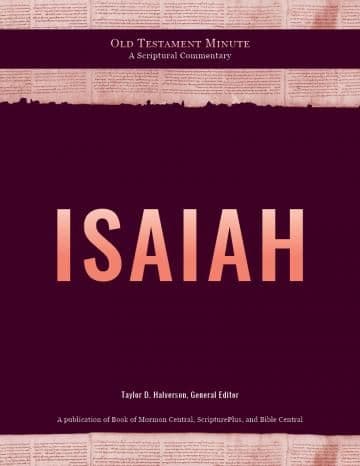Book
66 Chapters

Isaiah 19
Isaiah’s prophecy concerning Egypt has two parts: (1) Egypt experiences civil war, internal confusion, cruel leaders, and economic upheaval (19:1–17); and (2) Egypt turns to the Lord and worships Him (19:18–25). Scholars are uncertain as to the timing of the fulfillmnent of this prophecy. This two-part prophecy may be summarized in two words: “smite” and “heal”—the Lord smites Egypt, and then He heals it (see 18:22). Smiting occurs when people disobey the Lord; healing occurs when they return to Him. This chapter also reveals how the Lord controls and oversees the affairs of a nation (Doctrine and Covenants 117:6), here specifically, Egypt; “Lord” is named eighteen times in this chapter, showing that He has an active part in the prophecy.
the Lord is riding on a swift cloud. The Lord has power over the elements, including gravity, as if He moves on a “swift cloud” (see also 2 Samuel 22:11); He also rides on His cherub (Psalm 18:10), and He “maketh the clouds his chariot” (Psalm 104:3). idols of Egypt will tremble at His presence. Egypt, with its large pantheon of gods and goddesses, was completely engaged in idolatry. Speaking symbolically, the idols tremble at the Lord’s presence because of His great power.
I will provoke Egyptian against Egyptian. The Lord allowed the Egyptians to engage in civil war, “every one against his neighbor; city against city.” Because of the civil war, the Egyptians seek counsel from their idols, mediums, and spiritists. But none (but the Lord Himself), could help the Egyptians in their extreme need.
The Lord destroys one of Egypt’s greatest natural resources, the Nile River, which was the very foundation of Egypt’s economy (thus affecting farmers, fishermen, flax and weaving industries, and more). Isaiah summarizes, “All wage earners will despair” (19:10).
wise counselors of Pharaoh give absurd council. God’s judgments against Egypt strikes at their upper divisions of the social stratum, those in the Pharaoh’s inner circle, those of the royal family, and those in the highest ranks of government. But none of these can “make known what the Lord of Hosts has planned against Egypt” (19:12).
Where are your wise men? During the civil war and economic disruption, Isaiah asks Egypt, “Where are your wise men?” But even they cannot help the Egyptians, nor they do know “what the Lord . . . has planned against Egypt.”
officers of Zoan have become fools. Egypt’s leaders, from the important cities of Zoan and Memphis, were fools because they caused Egypt’s people to commit error.
When the Lord sends His judgments against Egypt, there will be “terror,” “confusion,” trembling, and “fear.”
uplifted hand of the Lord. The Lord uses a sacred gesture when He sends His judgments to Egypt.
land of Judah will be a terror to Egypt. For a period of time, the kingdom of Judah was a lesser power than Egypt. But after the Lord sends His judgments to Egypt, “the land of Judah will be a terror to Egypt.”
Isaiah’s prophecy transitions here; miraculously, Egypt (Israel’s long-time enemy) turns to Jehovah, Israel’s God, and worships Him. Verses 21–22 summarize, “The Egyptians will know the Lord in that day, and they will worship with sacrifice and offerings, and they will vow a vow unto the Lord and perform it. . . . And they will return to the Lord.”
language of Canaan. The Egyptians’ conversion is so complete that they will learn Hebrew, the sacred language of the Israelites and the Jews. swearing to the Lord. The Egyptians make covenants and oaths to the Lord. City of the Sun. This reading is from Isaiah DSS. The city of the sun is a city of light, perhaps the city of Jesus Christ, who is the sun (Psalm 84:11; Malachi 4:2).
altar to the Lord. Egypt will worship the Lord in that day rather than its pantheon of gods. The altar represents the Lord’s temple. pillar to the Lord.
This states that the pillar will serve as both a “sign” and a “witness” of the Lord throughout Egypt. It will be stationed at the border so that all visitors to Egypt will know that Jehovah is Egypt’s God.
He will send them the Savior, and the Defender. The Savior is none other than Jesus Christ; for “Defender,” the Hebrew rav can also read “Great One” or “Mighty One.” In place of “Defender,” the Isaiah scroll reads “and he will go down.”
Egyptians will know the Lord in that day. Isaiah artistically creates a chiasmus that emphasizes Egypt’s turning to Jehovah—Lord/be known/Egyptians/ /Egyptians/know/Lord.
The Lord will smite Egypt . . . and heal it. These words summarize the Lord’s divine work with Egypt. they will return to the Lord. “Return” (Hebrew shuv) means repentance in the Hebrew language.
These verses express the unity, possible because of Jesus Christ’s at-one-ment, that will exist between three former enemies—Israel, Egypt, and Assyria.
In that day there will be a highway. Why the highway? Anciently, highways were used for the purposes of commerce and trade, warfare, religious pilgrimages, and the like. But this highway is special because it will link former enemies as they join together to worship Jehovah; as the text states, “Egypt will worship with the Assyria.”
Blessed is Egypt, My people, and Assyria, the work of My hands, and Israel, My inheritance. Because of God’s great acts of redemption, Egypt, Assyria, and other nations will join covenant Israel and be called “My people.”
Book
66 Chapters
Items in the BMC Archive are made publicly available for non-commercial, private use. Inclusion within the BMC Archive does not imply endorsement. Items do not represent the official views of The Church of Jesus Christ of Latter-day Saints or of Book of Mormon Central.